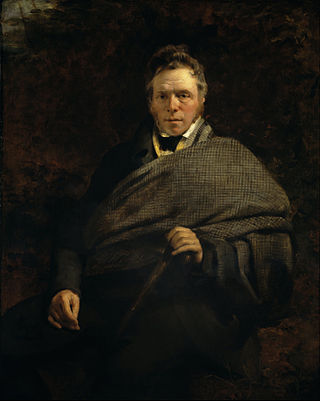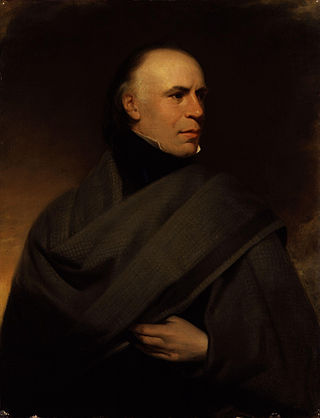Related Research Articles

The Yarrow Water is a river in the Borders in the south east of Scotland. It is a tributary of the Ettrick Water and renowned for its high quality trout and salmon fishing. The name "Yarrow" may derive from the Celtic word garw meaning "rough" or possibly share a derivation with the English name "Jarrow".

John Wilson of Elleray FRSE was a Scottish advocate, literary critic and author, the writer most frequently identified with the pseudonym Christopher North of Blackwood's Edinburgh Magazine.

James Hogg was a Scottish poet, novelist and essayist who wrote in both Scots and English. As a young man he worked as a shepherd and farmhand, and was largely self-educated through reading. He was a friend of many of the great writers of his day, including Sir Walter Scott, of whom he later wrote an unauthorised biography. He became widely known as the "Ettrick Shepherd", a nickname under which some of his works were published, and the character name he was given in the widely read series Noctes Ambrosianae, published in Blackwood's Magazine. He is best known today for his novel The Private Memoirs and Confessions of a Justified Sinner. His other works include the long poem The Queen's Wake (1813), his collection of songs Jacobite Relics (1819), and his two novels The Three Perils of Man (1822), and The Three Perils of Woman (1823).

Allan Cunningham was a Scottish poet and author.
The Noctes Ambrosianae, a series of 71 imaginary colloquies, appeared in Blackwood's Magazine from 1822 to 1835. The earlier ones had several different authors, including John Gibson Lockhart, William Maginn, James Hogg and Professor John Wilson, but from 1825, with the 19th in the series, the contributions by Wilson predominate, and he eventually wrote all or most of 39 of the dialogues, as well as parts of some others. The scene is usually set in Ambrose's Tavern in Edinburgh, and the central characters are "Christopher North", "Timothy Tickler", and the "Ettrick Shepherd". Several other characters, imaginary or based on real people, including the "English Opium Eater" and "The tailor o' Yarrow Ford" occur in some episodes. The series is particularly noted for the expressive Scots dialogue of the Ettrick Shepherd.

Critical and Miscellaneous Essays is the title of a collection of reprinted reviews and other magazine pieces by the Scottish essayist, historian and philosopher Thomas Carlyle. Along with Sartor Resartus and The French Revolution it was one of the books that made his name. Its subject matter ranges from literary criticism to biography, history and social commentary. These essays have been described as "Intriguing in their own right as specimens of graphic and original nonfiction prose…indispensable for understanding the development of Carlyle's mind and literary career", and the scholar Angus Ross has noted that the review-form displays in the highest degree Carlyle's "discursiveness, allusiveness, argumentativeness, and his sense of playing the prophet's part."

Scottish literature in the nineteenth century includes all written and published works in Scotland or by Scottish writers in the period. It includes literature written in English, Scottish Gaelic and Scots in forms including poetry, novels, drama and the short story.
The Queen's Wake is a narrative poem by James Hogg, first published in 1813. It consists of an Introduction, three Nights, and a Conclusion, totalling over five thousand lines, and there are also authorial notes. The poem presents the contributions, in various metres, of a series of Scottish bards to a competition organised by Mary, Queen of Scots on her arrival in Scotland from France in 1561.
The Mountain Bard (1807), containing 21 poems, was James Hogg's first substantial poetical publication.
The Forest Minstrel (1810) is an anthology of 83 songs, assembled by James Hogg, divided into four sections: 'Pathetic Songs', 'Love Songs', 'Humorous Songs', and 'National Songs'. Hogg himself is the author of 56 items. There are also 15 by Thomas Mounsey Cunningham, 5 by John Grieve, 3 by William Laidlaw, 3 by James Gray, and one perhaps by John Ballantyne.
Lock the Door, Lariston is a border ballad by the Scottish poet James Hogg, the "Ettrick Shepherd", first published in 1811. It describes a sixteenth-century armed raid by English border reivers across the Anglo-Scottish border, met and defeated by Scottish borderers led by Jock Elliott of Lariston. Written in a traditional form, it was set to music by the 1850s, and is now a commonly performed Scottish folk song.
The Pilgrims of the Sun is a narrative poem by James Hogg, first published in December 1814, dated 1815. It consists of four cantos, totalling somewhat less than 2000 lines. In similar vein to 'Kilmeny' in The Queen's Wake (1813), it tells of a young woman's journey to an ideal world and her return to earth.
Winter Evening Tales is a collection by James Hogg of four novellas, a number of short stories and sketches, and three poems, published in two volumes in 1820. Eleven of the items are reprinted, with varying degrees of revision, from Hogg's periodical The Spy (1810‒11).
A Queer Book (1832) is a collections of 26 poems, mostly short narratives, by James Hogg, all but two of which had been previously published, more than half of them in Blackwood's Edinburgh Magazine.
Altrive Tales (1832) by James Hogg is the only volume to have been published of a projected twelve-volume set with that title bringing together his collected prose fiction. It consists of an updated autobiographical memoir, a new novella, and two reprinted short stories.
Tales of the Wars of Montrose is a set of six fictional narratives by James Hogg published in 1835. Each of them centres on the fortunes of an individual during the civil conflict of the 1640s in Scotland.
The Shepherd's Calendar (1829) is a collection by James Hogg of 21 articles, most of which had appeared in Blackwood's Edinburgh Magazine since 1819. They are set in, or deal with aspects of, the Scottish Borders, in particular Hogg's native Ettrick Forest.
A Series of Lay Sermons is a set of eleven moral and religious discourses by James Hogg published in 1834.
Familiar Anecdotes of Sir Walter Scott, a memoir by James Hogg, was published in New York in 1834.
The Brownie of Bodsbeck (1818) is the first (short) novel by James Hogg. Set in the Scottish Borders in 1685 it presents a sympathetic picture of the persecuted Covenanters and a harsh view of the Royalists led by Clavers (Claverhouse). It draws extensively on local superstitions.
References
- ↑ The Collected Letters of James Hogg: Volume 2 1820‒1831, ed. Gillian Hughes (Edinburgh, 2006), 380: Hogg to William Blackwood, 11 April 1830.
- ↑ Songs, by The Ettrick Shepherd, ed. Kirsteen McCue with Janette Currie (Edinburgh, 2014), xxi‒xxiii.
- ↑ Ibid., xxiv‒xxv.
- ↑ James Hogg, A Queer Book, ed. P. D Garside (Edinburgh, 1995), xxi.
- ↑ The Literary Gazette, 1 January 1831, 5‒6 (6).